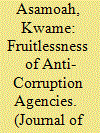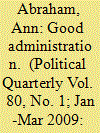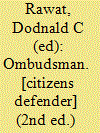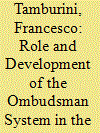|
|
|
Sort Order |
|
|
|
Items / Page
|
|
|
|
|
|
|
| Srl | Item |
| 1 |
ID:
162417


|
|
|
|
|
| Summary/Abstract |
Political corruption has become one of the most topical issues in the political discourse in Ghana. This stems from the fact that corruption has become so endemic and systemic in Ghanaian polity with its negative effects on the economy. Indeed, political corruption negatively affects job creation, investment potentials, infrastructural development and generally the standard of living of the people. It is within this context that anti-corruption institutions have been established in Ghana to address the menace of corruption. The Commission on Human Rights and Administrative Justice (CHRAJ) is one of such institutions established under the 1992 Republican Constitution of Ghana tasked with the responsibility of addressing the problem of corruption in Ghanaian public administration system. This paper examines the extent to which the Commission has achieved this constitutional mandate of addressing the problem of corruption. The study finds that some drawbacks which inhibit the potency of CHRAJ in addressing the problem of corruption include lack of political will by the governing elite to support the institution, eroding confidence of the Commission, the trend of appointing the Head of the Commission in an acting capacity, constitutional weaknesses, poor capacity building support and low motivation. The paper therefore offers pragmatic policy suggestions to address the inherent deficiencies of the Commission with the objective of making it more functional.
|
|
|
|
|
|
|
|
|
|
|
|
|
|
|
|
| 2 |
ID:
086968


|
|
|
|
|
| Publication |
2009.
|
| Summary/Abstract |
This article relates the concept of 'good administration' to a range of key constitutional issues, including The Governance of Britain, the debate about a British Bill of Rights, the creation of the Administrative Justice and Tribunals Council, and the Law Commission's consultation on public law remedy. It argues that 'good administration', far from being remote from these issues, is a critical component of much that we value most in public life. By drawing upon, for example, the Parliamentary Ombudsman's publication of Principles of Good Administration and the Court of Appeal judgment in a case concerning the Ombudsman's report on occupational pensions, the article suggests that the principles of deliberative democracy, human rights and restorative justice combine to make the Parliamentary Ombudsman an effective instrument for 'humanising the bureaucracy', as first envisaged when the Office was created by the Wilson government in 1967.
|
|
|
|
|
|
|
|
|
|
|
|
|
|
|
|
| 3 |
ID:
155856


|
|
|
|
|
| Summary/Abstract |
National Human Rights Institutions (NHRIs) have become hallmarks of good governance and democracy. Although many countries have an NHRI, it remains unclear how they operate on the regional level in political systems where democracy malfunctions and human rights are under pressure. Drawing on interviews, this essay examines how Russian nongovernmental organisations (NGOs) established a shadow Ombudsman—the Human Rights Council (HRC)—to protest against the appointment of an Ombudsman in St Petersburg and put pressure on authorities to inaugurate a new and independent Ombudsman. Although we would expect relations between the Ombudsman and NGOs to deteriorate when civil society is under pressure, this essay finds that political repression and the persona of the current Ombudsman, Alexander Shishlov, have brought civil society and the Ombudsman closer together.
|
|
|
|
|
|
|
|
|
|
|
|
|
|
|
|
| 4 |
ID:
024005


|
|
|
|
|
| Edition |
2nd ed.
|
| Publication |
London, George Allen & Unwin Ltd., 1965.
|
| Description |
xxiv, 384p.
|
|
|
|
|
|
|
|
|
|
|
|
Copies: C:1/I:0,R:0,Q:0
Circulation
| Accession# | Call# | Current Location | Status | Policy | Location |
| 001053 | 328.3452/RAW 001053 | Main | On Shelf | General | |
|
|
|
|
| 5 |
ID:
168248


|
|
|
|
|
| Summary/Abstract |
The institution of the Ombudsman is aimed at defending values such as human rights and the respect for the rule of law against any form of abuse or arbitrariness. Many academic studies have been devoted to the Ombudsman in its different developments around the world, but not to the Maghreb area. This article wants to shed light on the characteristics of the Ombudsman in Algeria, Mauritania, Morocco and Tunisia. The comparative exam of the different North African Ombudsmen will point out how the institution was able to survive only in states where a transition to democracy was truly in place.
|
|
|
|
|
|
|
|
|
|
|
|
|
|
|
|
| 6 |
ID:
138273


|
|
|
|
|
| Summary/Abstract |
The ombudsman institution, in both the public and private sectors, is increasingly identified with the ethos of consumerism and the protection of consumer rights. The current trend is exemplified and reinforced by the EU ADR Directive and by the government response to a recent inquiry into complaints conducted by the Public Administration Select Committee. This article argues that the dominant consumerist ethos diminishes the ability of the ombudsman institution to fulfil its potential. If the ombudsman institution, in particular as manifest in the office of the UK Parliamentary Ombudsman, is to serve the public interest, it must instead promote human rights principles and constitutional morality, adopt a process that is marked by public reasoning and participation and seek by a whole-system approach to realise a vision that is integrated and truly democratic.
|
|
|
|
|
|
|
|
|
|
|
|
|
|
|
|
|
|
|
|
|